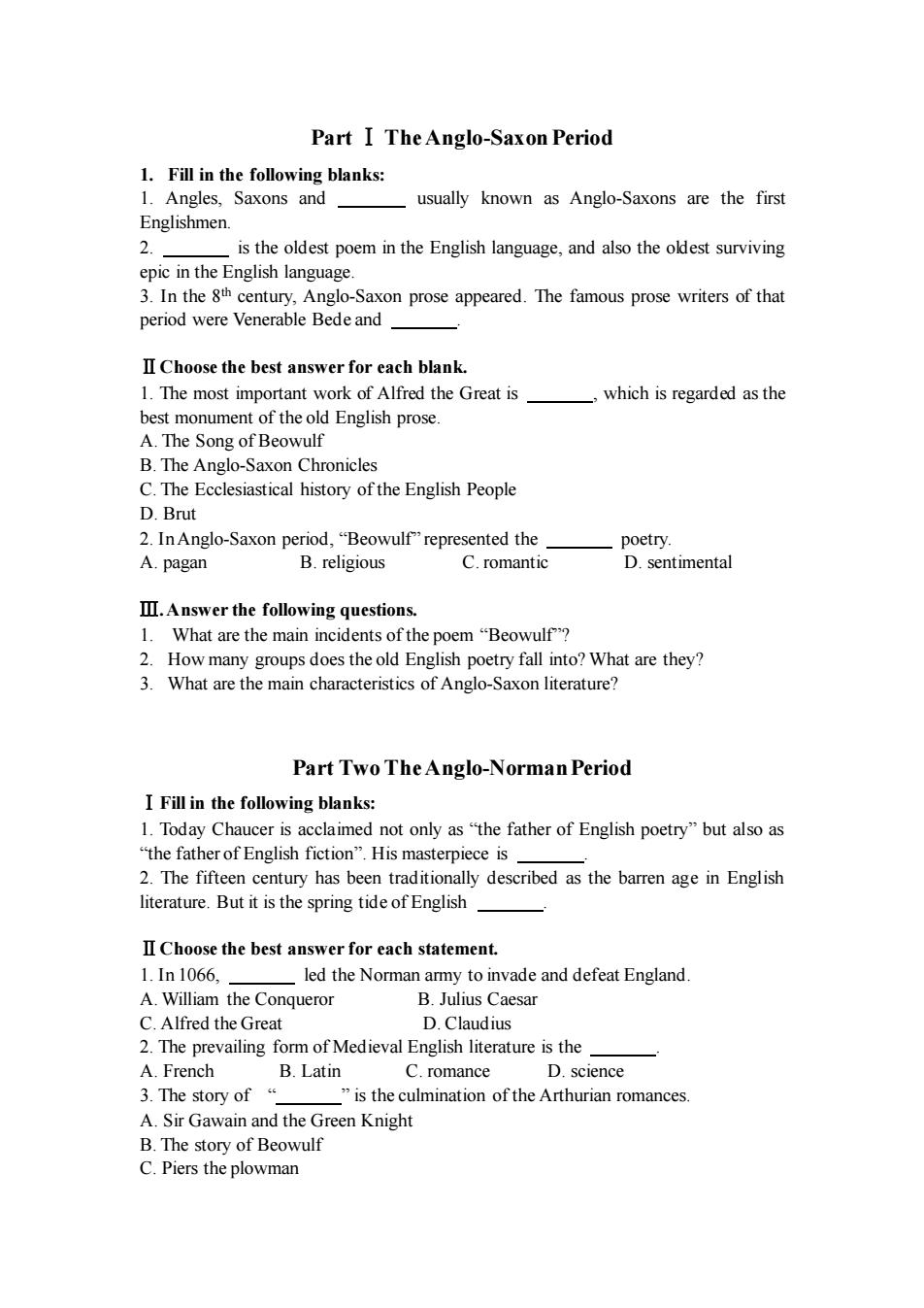
Part I The Anglo-Saxon Period 1.Fill in the following blanks: 1.Angles.Saxons and usually known as Anglo-Saxons are the first Englishmen. 2. is the oldest poem in the English language,and also the oldest surviving century Ang -Saxon prose appeared.The famous prose writers of that period were Venerable Bede and II Choose the best answer for each blank. 1.The most important work of Alfred the Great is which is regarded as the of theold English prose B.The Anglo-Saxon Chronicles C.The Ecclesiastical history of the English People D Brut 2.In Anglo-Saxon pe riod,"Beowulf"represented the B.religious C.romantic 、poetry A.pagan D.sentimental II.Answer the following questions. 1.What are the main incidents of the poem"Beowulf? 2.How many English poetry fall into?What are they? What are the main characteristics of Anglo-Saxon literature? Part Two The Anglo-Norman Period I Fill in the following blanks: 1.Today Chaucer is acelaimed not only as"the father of English poetry"but also as the father of English fiction".His masterpiece is 2.The fifteen century has been traditionally described as the barren age in English literature.But it is the spring tide of English IIChoose the best answer for each statement. 1.1n1066. led the Norman army to invade and defeat England. A.William the Conqueror B.Jullus Caesar C.Alfred the Great D.Claudius 2.The prevailing form of Medieval English literature is the B.Latin romance D.sc 3.The story of "is the culmination of the Arthurian romances. A.Sir Gawain and the Green Knight B.The story of Beowulf C.Piers the plowman
Part Ⅰ The Anglo-Saxon Period 1. Fill in the following blanks: 1. Angles, Saxons and usually known as Anglo-Saxons are the first Englishmen. 2. is the oldest poem in the English language, and also the oldest surviving epic in the English language. 3. In the 8th century, Anglo-Saxon prose appeared. The famous prose writers of that period were Venerable Bede and . ⅡChoose the best answer for each blank. 1. The most important work of Alfred the Great is , which is regarded as the best monument of the old English prose. A. The Song of Beowulf B. The Anglo-Saxon Chronicles C. The Ecclesiastical history of the English People D. Brut 2. In Anglo-Saxon period, “Beowulf” represented the poetry. A. pagan B. religious C. romantic D. sentimental Ⅲ. Answer the following questions. 1. What are the main incidents of the poem “Beowulf”? 2. How many groups does the old English poetry fall into? What are they? 3. What are the main characteristics of Anglo-Saxon literature? Part Two The Anglo-Norman Period ⅠFill in the following blanks: 1. Today Chaucer is acclaimed not only as “the father of English poetry” but also as “the father of English fiction”. His masterpiece is . 2. The fifteen century has been traditionally described as the barren age in English literature. But it is the spring tide of English . ⅡChoose the best answer for each statement. 1. In 1066, led the Norman army to invade and defeat England. A. William the Conqueror B. Julius Caesar C. Alfred the Great D. Claudius 2. The prevailing form of Medieval English literature is the . A. French B. Latin C. romance D. science 3. The story of “ ” is the culmination of the Arthurian romances. A. Sir Gawain and the Green Knight B. The story of Beowulf C. Piers the plowman
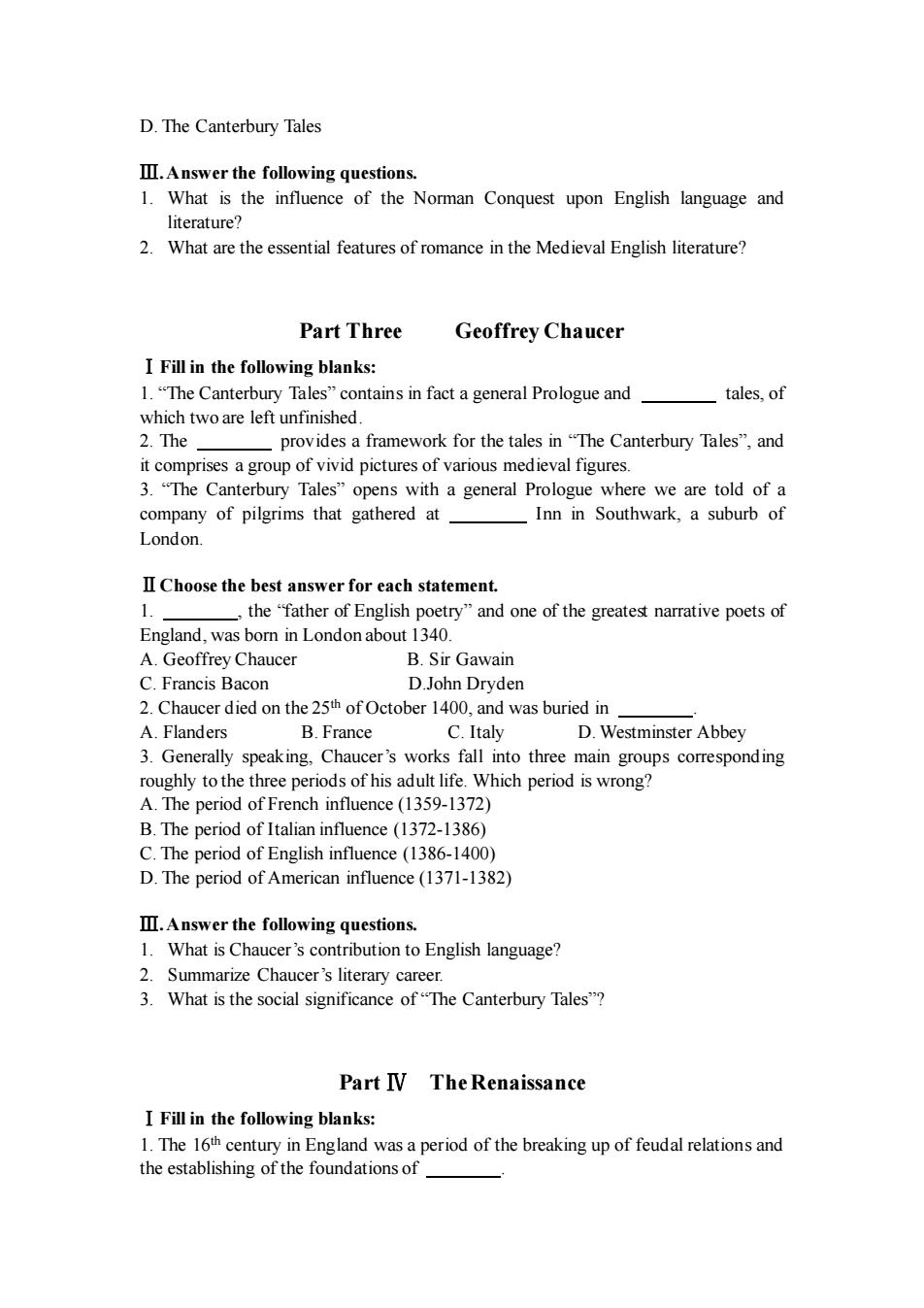
D.The Canterbury Tales II.Answer the following questions. 1.What is the influence of the Norman Conquest upon English language and literature? 2.What are the essential features of romance in the Medieval English literature? Part Three Geoffrey chaucer I Fill in the following blanks: 1.The Canterbury Tales"contains in fact a general Prologue and tales,of hchwoaIeleunfinished 2.The provides a framework for the tales in "The Canterbury Tales".and it comprises a group of vivid pictures of various medieval figures. 3."The Canterbury Tales"opens with a general Prologue where we are told of a company of pilgr ms that gathered at Inn in Southwark a suburb of Londor II Choose the best answer for each statement. 1. the"father of English poetry"and one of the greatest narrative poets of England,was born in London about 1340. B.Sir Gawair D.John Dryden 2.Chaucer died on the25th of October 1400,and was buried in A.Flanders b france C.Italy D.Westminster Abbey 3.Generally speaking,Chaucer's works fall into three main groups corresponding roughly to the threc iods of his adult life.Which period is wrong A.The period of French influence(1359-1372) B.The period of Italian influence (1372-1386) C.The period of English influence(1386-1400) D.The period of American influence(1371-1382) II.Answer the following questions 1.What is Chaucer's contribution to English language? 2.Summarize Chaucer's literary career. 3.What is the social significance of"The Canterbury Tales"? Part I The Renaissance I Fill in the following blanks: 1.The 16th century in England was a period of the breaking up of feudal relations and the establishing of the foundations of
D. The Canterbury Tales Ⅲ. Answer the following questions. 1. What is the influence of the Norman Conquest upon English language and literature? 2. What are the essential features of romance in the Medieval English literature? Part Three Geoffrey Chaucer ⅠFill in the following blanks: 1. “The Canterbury Tales” contains in fact a general Prologue and tales, of which two are left unfinished. 2. The provides a framework for the tales in “The Canterbury Tales”, and it comprises a group of vivid pictures of various medieval figures. 3. “The Canterbury Tales” opens with a general Prologue where we are told of a company of pilgrims that gathered at Inn in Southwark, a suburb of London. ⅡChoose the best answer for each statement. 1. , the “father of English poetry” and one of the greatest narrative poets of England, was born in London about 1340. A. Geoffrey Chaucer B. Sir Gawain C. Francis Bacon D.John Dryden 2. Chaucer died on the 25th of October 1400, and was buried in . A. Flanders B. France C. Italy D. Westminster Abbey 3. Generally speaking, Chaucer’s works fall into three main groups corresponding roughly to the three periods of his adult life. Which period is wrong? A. The period of French influence (1359-1372) B. The period of Italian influence (1372-1386) C. The period of English influence (1386-1400) D. The period of American influence (1371-1382) Ⅲ. Answer the following questions. 1. What is Chaucer’s contribution to English language? 2. Summarize Chaucer’s literary career. 3. What is the social significance of “The Canterbury Tales”? Part Ⅳ The Renaissance ⅠFill in the following blanks: 1. The 16th century in England was a period of the breaking up of feudal relations and the establishing of the foundations of
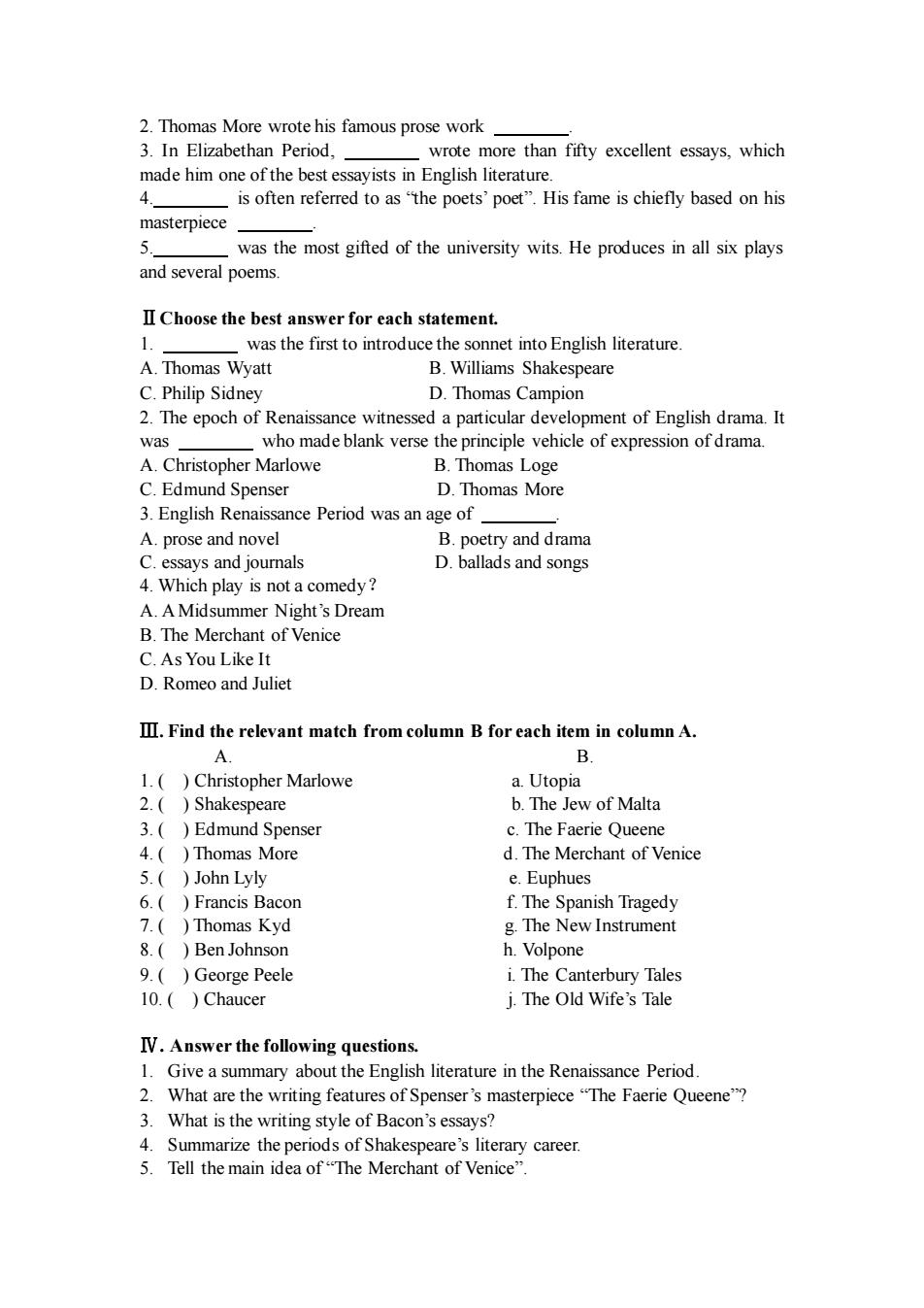
2.Thomas More wrote his famous prose work 3.In Elizabethan Period ore than fifty excellent essays,which made him one ofthe best essayists in English literature is often referred to as'the poets'poet".His fame is chiefly based on his masterpiece was the most gifted of the university wits.He produces in all six plays and several poems IChoose the best answer for each statement. was the first to introduce the sonnet into English literature A.Thomas Wyatt B Williams Shakespeare C.Philip Sidney D.Thomas Campion A.Christopher Marlowe B.Thomas Loge C.Edmund Spenser D.Thomas more 3 English renaissance period was an age of llads and songs A.A Midsummer Night's Dream B.The Merchant of Venice C As You like it D.Romeo and Juliet II.Find the relevant match from column B for each item in column A. A B 1.()Christopher Marlowe 2( Shake b.The Jew of Malta 3.()Edmund Spenser c.The Faerie Queene 4.()Thomas More d.The Merchant of Venice 5.(John Lyly e.Euphues 6.()Francis Bacon f.The Spanish Tragedy 7.(Thomas Kyd g.The New Instrumen 8.( )Ben Johnsor h.Volpone 9.(George Peele i.The Canterbury Tales 10.()Chaucer i The Old Wife's Tale IV.Answer the following questions.he Renaissal Give a summary about th nce Period. 2.What are the writing features of Spenser's masterpiece"The Faerie Queene? 3.What is the writing style of Bacon's essays? 4.Summarize the periods of Shakespeare's literary career. 5.Tell the main idea of"The Merchant of Venice
2. Thomas More wrote his famous prose work . 3. In Elizabethan Period, wrote more than fifty excellent essays, which made him one of the best essayists in English literature. 4. is often referred to as “the poets’ poet”. His fame is chiefly based on his masterpiece . 5. was the most gifted of the university wits. He produces in all six plays and several poems. ⅡChoose the best answer for each statement. 1. was the first to introduce the sonnet into English literature. A. Thomas Wyatt B. Williams Shakespeare C. Philip Sidney D. Thomas Campion 2. The epoch of Renaissance witnessed a particular development of English drama. It was who made blank verse the principle vehicle of expression of drama. A. Christopher Marlowe B. Thomas Loge C. Edmund Spenser D. Thomas More 3. English Renaissance Period was an age of . A. prose and novel B. poetry and drama C. essays and journals D. ballads and songs 4. Which play is not a comedy? A. A Midsummer Night’s Dream B. The Merchant of Venice C. As You Like It D. Romeo and Juliet Ⅲ. Find the relevant match from column B for each item in column A. A. B. 1. ( ) Christopher Marlowe a. Utopia 2. ( ) Shakespeare b. The Jew of Malta 3. ( ) Edmund Spenser c. The Faerie Queene 4. ( ) Thomas More d. The Merchant of Venice 5. ( ) John Lyly e. Euphues 6. ( ) Francis Bacon f. The Spanish Tragedy 7. ( ) Thomas Kyd g. The New Instrument 8. ( ) Ben Johnson h. Volpone 9. ( ) George Peele i. The Canterbury Tales 10. ( ) Chaucer j. The Old Wife’s Tale Ⅳ.Answer the following questions. 1. Give a summary about the English literature in the Renaissance Period. 2. What are the writing features of Spenser’s masterpiece “The Faerie Queene”? 3. What is the writing style of Bacon’s essays? 4. Summarize the periods of Shakespeare’s literary career. 5. Tell the main idea of “The Merchant of Venice
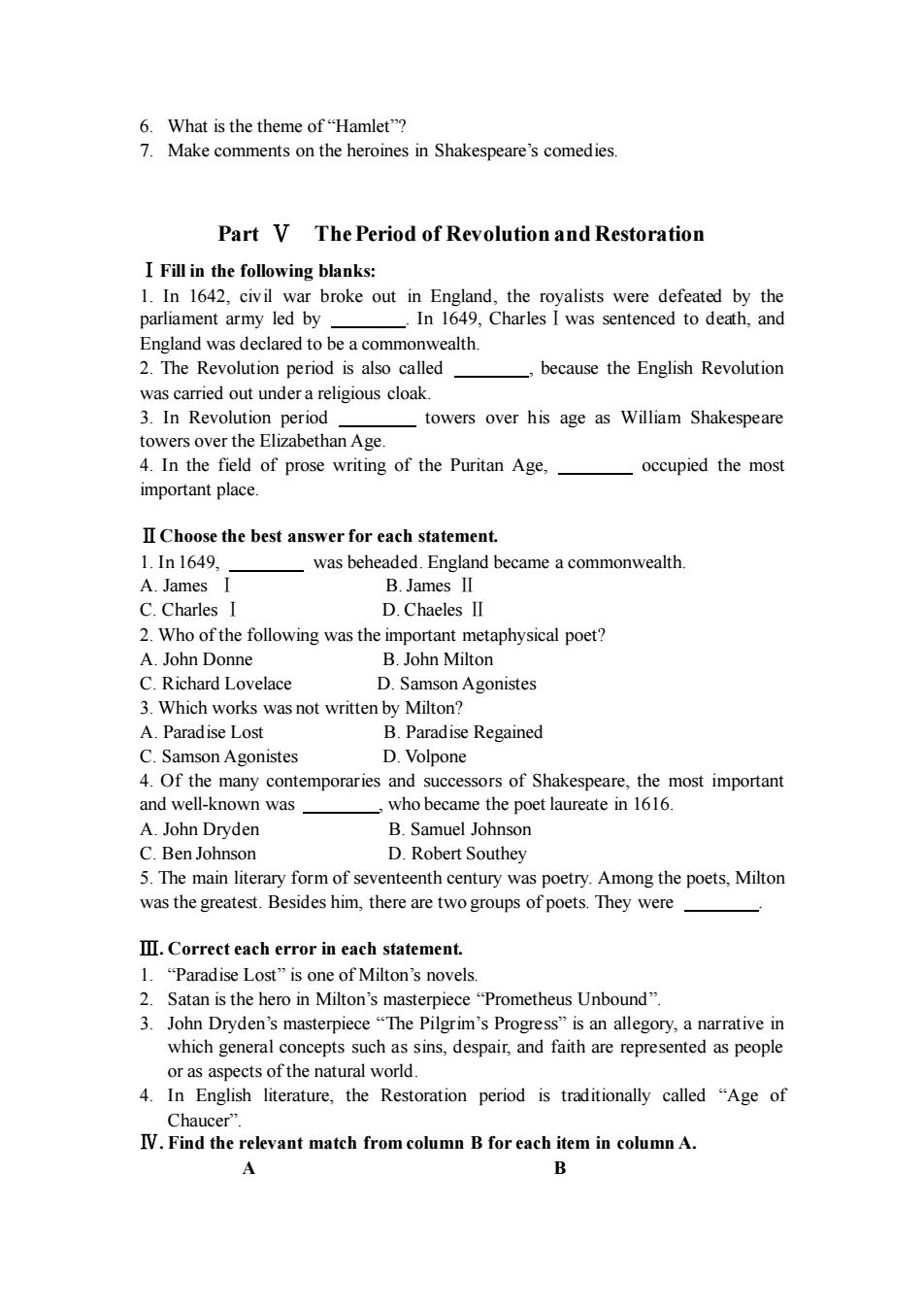
6.What is the theme of"Hamlet"? 7.Make comments on the heroines in Shakespeare's comedies. Part V The Period of Revolution and Restoration I Fill in the following blanks: 1.In 1642,civil war broke out in England,the royalists were defeated by the parliament army led by _In 1649,Charles I was sentenced to death,and England was declared to be a commonwealth. 2.The Revolution period is also called because the English Revolution arried out under a religious cloak 3.In Revolution perio towers over his age as William Shakespeare towers over the Elizabethan Age. 4.In the field of prose writing of the Puritan Age, occupied the most important place. IIChoose the best answer for each statement. 1.In1649 was beheaded.England became a commonwealth A.James B.James Il C.Charles I D.Chaeles II 2.Who of the following was the important metaphysical poet? A.John Donn B.John Miltor C.Richard Lovelace D.S imson Agonistes 3.Which works was not written by Milton? A.Paradise Lost B.Paradise Regained C.Samson Agonistes D.Volpone 4 Of the n emporaries and s Shakespeare.the most important and any co well-known was o became the poet laureate in 1616 A.John Dryden B.Samuel Johnson C.Ben Johnson D.Robert Southev 5.The main literary form of seventeenth century was poetry.Among the poets,Milton was the greatest.Besides him,there are two groups of poets.They were II.Correct each error in each statement. “Paradise I,ost”is one of Milton's novels 2.Satan is the hero in Milton's masterpiece"Prometheus Unbound". 3.John Dryden's masterpiece"The Pilgrim's Progress"is an allegory,a narrative in which ch as si .despair,and faith ar te ed as people or as aspects o of the natural world 4.In English literature,the Restoration period is traditionally called "Age of Chaucer". IV.Find the relevant match from column B for each item in column A. A B
6. What is the theme of “Hamlet”? 7. Make comments on the heroines in Shakespeare’s comedies. Part Ⅴ The Period of Revolution and Restoration ⅠFill in the following blanks: 1. In 1642, civil war broke out in England, the royalists were defeated by the parliament army led by . In 1649, CharlesⅠwas sentenced to death, and England was declared to be a commonwealth. 2. The Revolution period is also called , because the English Revolution was carried out under a religious cloak. 3. In Revolution period towers over his age as William Shakespeare towers over the Elizabethan Age. 4. In the field of prose writing of the Puritan Age, occupied the most important place. ⅡChoose the best answer for each statement. 1. In 1649, was beheaded. England became a commonwealth. A. James Ⅰ B. James Ⅱ C. Charles Ⅰ D. Chaeles Ⅱ 2. Who of the following was the important metaphysical poet? A. John Donne B. John Milton C. Richard Lovelace D. Samson Agonistes 3. Which works was not written by Milton? A. Paradise Lost B. Paradise Regained C. Samson Agonistes D. Volpone 4. Of the many contemporaries and successors of Shakespeare, the most important and well-known was , who became the poet laureate in 1616. A. John Dryden B. Samuel Johnson C. Ben Johnson D. Robert Southey 5. The main literary form of seventeenth century was poetry. Among the poets, Milton was the greatest. Besides him, there are two groups of poets. They were . Ⅲ. Correct each error in each statement. 1. “Paradise Lost” is one of Milton’s novels. 2. Satan is the hero in Milton’s masterpiece “Prometheus Unbound”. 3. John Dryden’s masterpiece “The Pilgrim’s Progress” is an allegory, a narrative in which general concepts such as sins, despair, and faith are represented as people or as aspects of the natural world. 4. In English literature, the Restoration period is traditionally called “Age of Chaucer”. Ⅳ. Find the relevant match from column B for each item in column A. A B
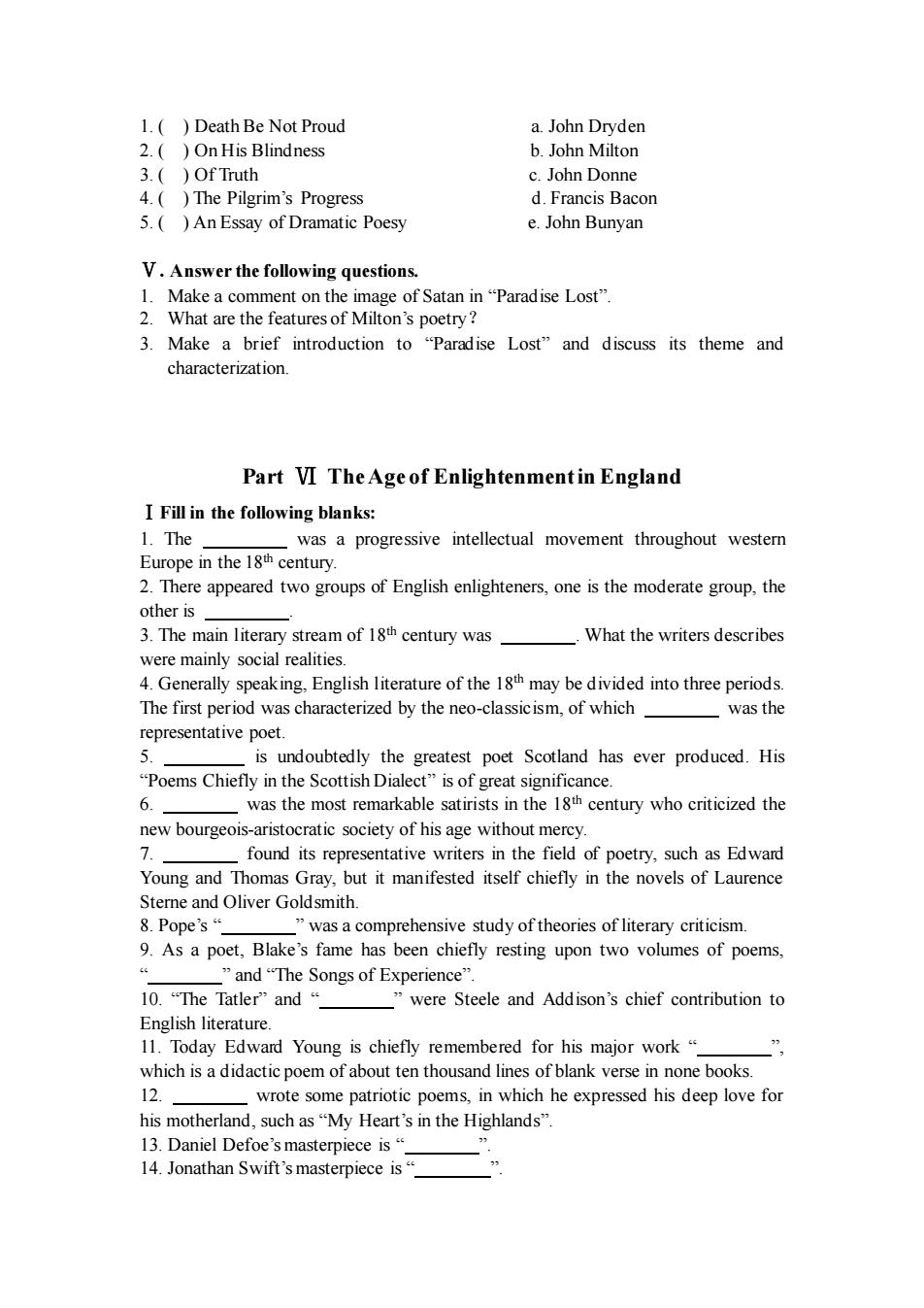
1.()Death Be Not Proud a John Dryden )On His Blindness b.John Miltor )Of Truth c.John Donne 4.)The Pilgrim's Progress d.Francis Bacon 5.()An Essay of Dramatic Poesy e.John Bunyan V.Answer the following questions. ke a comment on the 3.Make a brief introduction to "Paradise Lost"and discuss its theme and characterization. Part VI The Age of Enlightenmentin England I Fill in the following blanks: 1.The was a progressive intellectual movement throughout western Europein thecentury. 2.There appeared two groups of English enlighteners,one is the moderate group,the other is 3.The main literary stream of 18th century was What the writers describes were mainly social realities 4.Generally speaking.of themay bedivded int three periods The first period was characterized by the neo-classicism,of which was the representative poet. is undoubtedly the greatest poet Scotland has ever produced.His "Poems chiefly in the scottish Dialect"is of great significance as the most remarkable satir ts in the1century who criticized the new bourgeois s-aristocratic society of his age without mercy. found its representative writers in the field of poetry.such as Edward Young and Thomas Gray,but it manifested itself chiefly in the novels of Laurence Sterne and Oliver Goldsmith. 8 Pope's" was a comprehensive study of theories of literary criticism. 9.As a poet,Blake's fame has been chiefly resting upon two volumes of poems "and"The Songs of Experience" 10.The Tatler'”and“ were Steele and Addison's chief contribution to English literature. 11.Today Edward Young is chiefly remembered for his major work" ” which is a didacticpoer of ab out ten thousar bla nk vers 12. wrote some patriotic poems,in which he expressed his deep love for his motherland,such as"My Heart's in the Highlands" 13.Daniel Defoe's masterpiece is" 14.Jonathan Swift's masterpiece is
1. ( ) Death Be Not Proud a. John Dryden 2. ( ) On His Blindness b. John Milton 3. ( ) Of Truth c. John Donne 4. ( ) The Pilgrim’s Progress d. Francis Bacon 5. ( ) An Essay of Dramatic Poesy e. John Bunyan Ⅴ.Answer the following questions. 1. Make a comment on the image of Satan in “Paradise Lost”. 2. What are the features of Milton’s poetry? 3. Make a brief introduction to “Paradise Lost” and discuss its theme and characterization. Part Ⅵ The Age of Enlightenment in England ⅠFill in the following blanks: 1. The was a progressive intellectual movement throughout western Europe in the 18th century. 2. There appeared two groups of English enlighteners, one is the moderate group, the other is . 3. The main literary stream of 18th century was . What the writers describes were mainly social realities. 4. Generally speaking, English literature of the 18th may be divided into three periods. The first period was characterized by the neo-classicism, of which was the representative poet. 5. is undoubtedly the greatest poet Scotland has ever produced. His “Poems Chiefly in the Scottish Dialect” is of great significance. 6. was the most remarkable satirists in the 18th century who criticized the new bourgeois-aristocratic society of his age without mercy. 7. found its representative writers in the field of poetry, such as Edward Young and Thomas Gray, but it manifested itself chiefly in the novels of Laurence Sterne and Oliver Goldsmith. 8. Pope’s “ ” was a comprehensive study of theories of literary criticism. 9. As a poet, Blake’s fame has been chiefly resting upon two volumes of poems, “ ” and “The Songs of Experience”. 10. “The Tatler” and “ ” were Steele and Addison’s chief contribution to English literature. 11. Today Edward Young is chiefly remembered for his major work “ ”, which is a didactic poem of about ten thousand lines of blank verse in none books. 12. wrote some patriotic poems, in which he expressed his deep love for his motherland, such as “My Heart’s in the Highlands”. 13. Daniel Defoe’s masterpiece is “ ”. 14. Jonathan Swift’s masterpiece is “